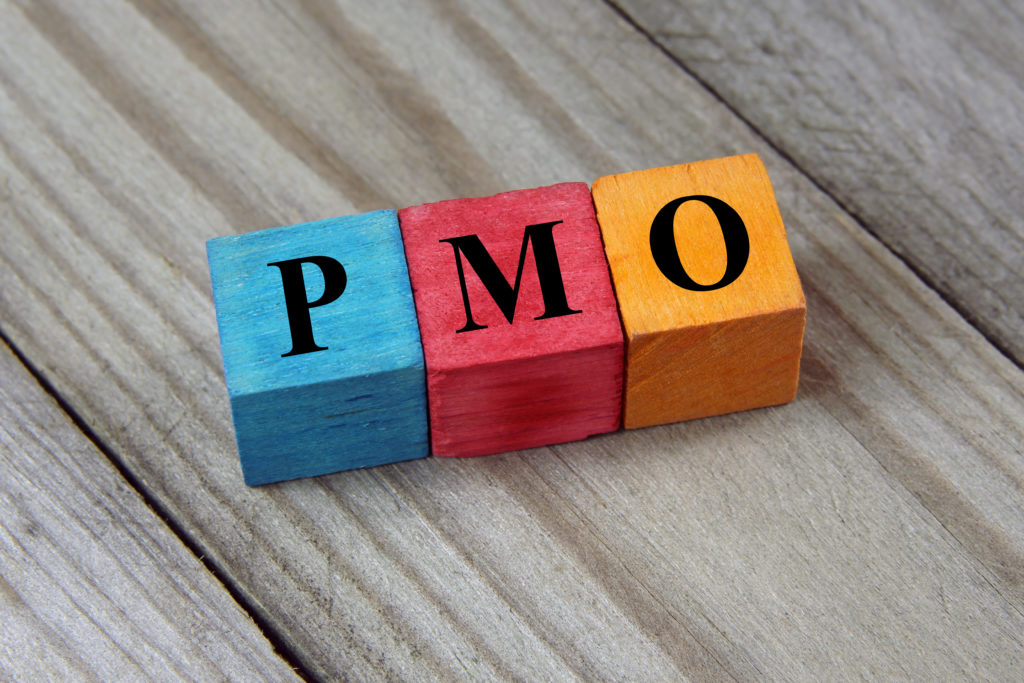PMO stands for Project Management Office. It represents an entity that supports the project organisation with all kinds of project related activities. A PMO can be set up with limited responsibility, like taking minutes, archiving documents, apply naming conventions, chase project members, prepare presentations (let’s call it ‘supportive’ throughout this blog). Or a PMO can be set up with full responsibility, with activities to align the directions of different projects, question feedback, coach members and manoeuvre within the political organisation to make sure goals will be met (let’s call it ‘guidance’). In both cases, the Program/ Project Manager transfers his/ her responsibility to the PMO, but remains accountable! Which role a PMO will play (supportive or guidance) depends on your organisation and the goals to be achieved with the PMO.
From a more supportive perspective, the PMO is an ideal learning environment for less experienced project members that want to learn and grow into this area of expertise. Supporting the project managers in the day-to-day operational tasks of the PMO like administration, preparing meetings, taking notes, gives them a protected environment to watch, question and learn. Especially when supporting several project managers accelerates this learning process as different people have different styles and different focus points.
From the guiding perspective, project- and change management experience comes in handy. Knowing how to ‘read’ an organisation and people, knowing how to respond, knowing how to deal with difficult situations and take the proper action will be learned over time, after making numerous mistakes. This is a growth trajectory for the less experienced project manager into a more mature role, and is a nice step-up after the supportive role becomes mundane and the PMO member is ready for a next challenge.
The PMO performs, besides the supportive and guiding role, therefore a growth path for the ‘eager-to-learn’ but unexperienced project manager. But what does the PMO bring the organisation itself? What benefits are there to be expected for the project members, departments, management team of an organisation? My answer: it depends. It depends on the role the PMO plays within the organisation, how much responsibility and autonomy will be transferred from the project members to the PMO, the maturity of the organisation in project management, the political environment, the culture.
The PMO can be established in different ways, ranging from hardly any responsibility to full responsibility. In the first case, the PMO provides only supportive activities like taking notes and making minutes, archiving document and arranging and preparing meetings. The added value of the PMO is there, but limited (compared to full responsibility), and will only be implemented as the organisation is very mature in running different projects in parallel to achieve the strategic goals. Project members have time to work on project related activities besides other, operational tasks. But an operational issue hardly does impact the work they spend on their projects. Project members are aware of their dual role in the organisation (operational versus project) and stick to plans or communicate early when deadlines will not be met. And really experienced project members have a few possible mitigations in place if these risks occur.
If the organisation is less experienced in running projects or the number of operational issues are very frequent, and the impact is severe, a full-fledged PMO will add much more value. The PMO, besides the supportive role, can support the project members in guiding them to achieve the deliverables. PMO members are likely to touch base with project members much more frequent compared to a supportive role and discuss progress, risks, mitigations, and issues. PMO will not perform the project tasks at hand, but will form a coaching relationship with project members on the work to be done. And as you can see, this type of PMO work requires much more experienced PMO members.
So, does it make sense to have a PMO when running several projects within your organisation? My straight answer: YES. It always makes sense, but it depends on the maturity of the organisation, the operational type of work and number of issues, the willingness to centralise project related work and setup of a PMO.
But once a PMO is set up, the benefits will be great and compound over time. Junior PMO members will grow in experience and become your next batch of project members, the PMO is a Center of Excellence regarding standards, ways of working and over time a splendid source of project management related material.
A PMO does make sense!










0 Comments